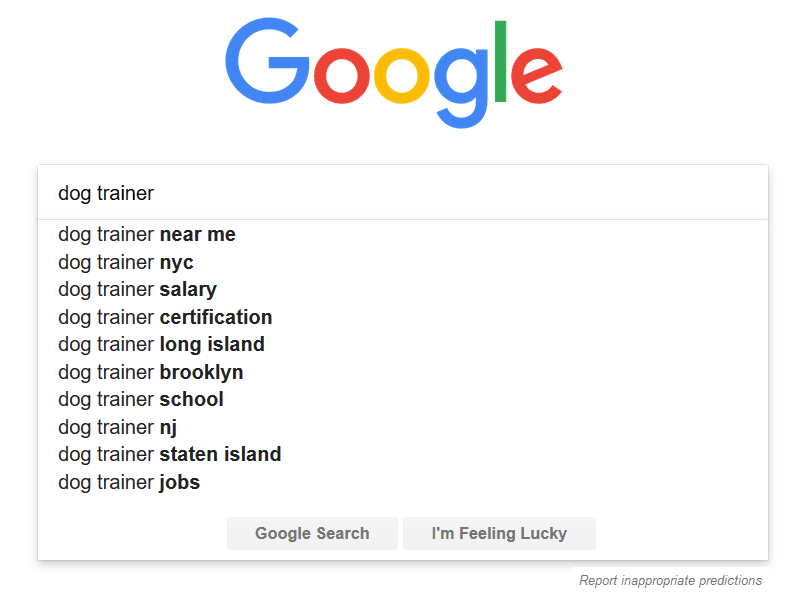Keyword research is the backbone of any
However many people don’t utilize all the possible tools at their disposal when doing keyword research. Many simple use Google Adwords Keyword Planner as the end-all, be-all, and leave it at that.
This is a shame, because there are several keyword research tools and techniques that can be used to make sure you discover the most relevant keywords to reach your users. I’ve outlined some of them below, enjoy!
Search Suggest Tools
You may have heard about search suggest tools, but in case you haven’t, I’ll give a quick rundown.
These tools leverage Google Suggest, the feature that helps you autocomplete your queries so you don’t have to type them all out. Introduced in 2008, Google Suggest quickly became the source for long tail keyword research. You’ve probably seen this common sight when searching:
Ubersuggest
By 2011 UberSuggest launched to give webmasters a way to access these suggestions at scale. It does this by appending “a” through “z” and “0” through “9” to your target keyword, and pulling the suggestions for each combination.
The end result is something like the screenshot below:

Cool, right?
Answer the Public
A few years back another tool came on the scene that does very similar things, but slightly different, AnswerthePublic.com.
In addition to appending a-z and 0-9, Answer the Public also adds the “five W’s” (what, why, when, who, where), as well as prepositions and other variety of words. This elicits a lot more keywords, and very useful ones at that.
It also adds a very cool visual element, see screenshot:

Of course it also allows for an export everything to a CSV for easy spreadsheet analysis.
Manual Search Suggest Tricks
The limitation to all these tools is that they only append suggestions to the end of the seed keyword. A lot of the time this can be just fine, but sometimes it can leave a lot of “money on the table”, so to speak. Let’s take this one example from the keyword “best for dogs”:

Not bad, but probably not the “best X for dogs” we might be looking for.
Now if you take the cursor and move it to the middle of the phrase, hit the space bar, and watch the keywords roll in:

Cool, right?
I use this whenever I need to get inspiration on new content ideas.
Also remember to inject A-Z just like the tools do, to make sure you surface all the opportunities.
Keywords Everywhere
Now, all these keyword suggestion tools and great and all, but so far there is no keyword volume associated with them. This means that while you know the terms is searched on occassion, you can’t keep you eye out for really high volume, low competition keywords (the sweet spot for any
This is where the Keywords Everywhere addon comes into play. Before this added you would need to copy/paste any keyword in the Google Adwords Keyword tool to get an idea of volume, and now that they’ve shut off keyword volume data to non-paid accounts, many SEOs can’t even access that!
Keywords Everywhere makes it incredibly simple and convenient, populating Google SERPs with keyword volume and CPC data, all for free and without the need for a paid Adwords account. Amazing!
Take a look at the screenshot here:

See the “Volume” data underneath the search box? They also have it for related searches:

I don’t know how I did keyword research before this plugin, honestly.
And now the coup de grâce, Keywords Everywhere integrates with UberSuggest to pull in all the volumes for search suggestions. Boom!

Sadly you can’t export the volume data straight from Ubersuggest, but you can add the keywords to the KeywordsEverywhere plugin and export from there.
That’s all I’ve got from the search suggest tools, but I’ve got a couple more tricks up my sleeve.
Google Search Console and Adwords
Search Console
When Google introduced the “Search Analytics” portion of Google Search Console, it “consoled” a lot of webmasters (see what I did there?) that were royally miffed at the whole “not provided” keyword debacle of 2011. While it doesn’t provide 100% of your queries (only the top 1000 or so), this is more than enough for most sites.
It also serves as a potential keyword research tool. By browsing through the queries you can see areas where you aren’t ranking well, long tail keywords that might be able to use their own landing page, as well as diagnose low CTR that might require a rework of meta descriptions or title tags.

Adwords
Furthermore, one other neat little trick for those that have active PPC ad campaigns.
If you are using phrase or broad match keywords, you will be getting visibility for lots of keyword variations. The “search term” report shows you all of those keywords, and this can help you find opportunities such as:
- New locations to target
- New sub-niches or pain points
- New wording to use in Ad copy/Meta Descriptions
In the Adwords interface you need to navigate to “Keywords” and then “Search Terms” tabs, see screenshot:

This is one of the added perks of having an Adwords campaign, Google finally gives you complete access to your keyword data!
Conclusion
These are a few extra tips and tools for conducting thorough keyword research. I encourage everyone to take a second look at their keyword targeting at least once per year, and using these tactics you will be sure to get a comprehensive look at your content opportunities.
Thanks for reading!


